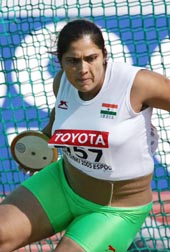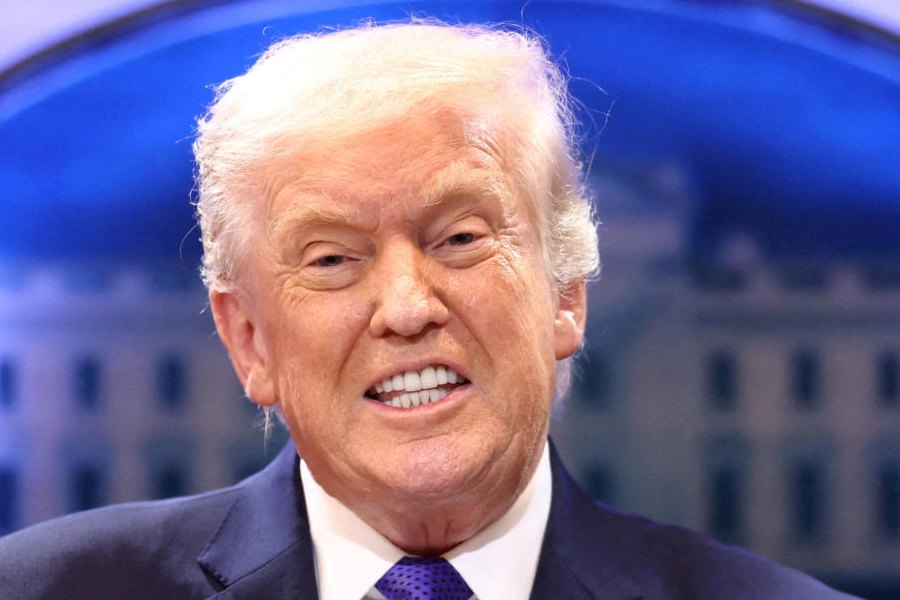 |
| Neelam J. Singh in action during the discus qualifiers in Helsinki last Sunday. She became the first Indian to be caught ‘cheating’ at the world meet |
New Delhi: Busan Asian Games gold-medallist Neelam Jaswant Singh tested postive for a banned drug at the World Athletic Championships in Helsinki, adding yet another shameful chapter to the country’s sporting scene.
After a series of Indian dope scandals in Busan and the Athens Olympics, the 34-year old discus thrower became the latest to join the list of offenders when she tested positive for pemoline ? a banned stimulant ? according to information received here.
As per IAAF rules, she has been provisionally suspended, pending a hearing before the disciplinary tribunal of the Athletics Federation of India (AFI). The sanction for a first-time violation for pemoline is a minimum of two-year ban.
Neelam, ranked 26th in the world, not only became the first Indian to test positive at a World Championship but is also the first to be caught cheating in the Helsinki edition of the prestigious meet.
The 34-year-old, who has many firsts to her credit, was the first Indian woman athlete to win a medal in the Commonwealth Games when she won the silver in Manchester.
Neelam made it to the final of the 2003 World Championships in Paris, but could hardly make an impact in Helsinki. She managed to hurl the discus to only 56.70 m, far below her personal best of 64.55, and went out in the preliminary round last Sunday.
In Hoshiarpur, Neelam’s family sprung to her defence claiming she was innocent.
The athlete’s mother-in-law Sital Kaur had a possible explanation. She said while Neelam was preparing for the Olympics last year, she had suffered a disc problem and was recommended anti-inflammatory medicine which she continued to take for quite some time under medical supervision.
Claiming the 1998 Arjuna Award winner, who had distinguished herself over a career spanning nearly 15 years, could never take any drug which would affect her career, Kaur alleged that a false propaganda had been launched to malign the athlete.
India had sent a three-member squad to Helsinki which included Paris long-jump bronze-medallist Anju Bobby George and discus thrower Vikas Gowda. While Anju finished fifth, Neelam and Vikas failedto get past the qualification stage.
The others involved in dope scandals previously include Sunita Rani, who was caught in Busan before being exonerated following loopholes in the laboratory report. Sunita won a gold and a bronze at the Asian Games.
At the Athens Olympics, three women weightlifters tested positive for banned substances. Pratima Kumari was caught for using a banned steroid in a pre-competition test, Sanamacha Chanu tested positive during the competition for using a banned diuretic, as did Kunjurani Devi.
Chanu was the fourth Indian lifter to test positive in 2004.
HALL OF IGNOMINY
2001
• Seema Antil (Discus) — Tested positive for the steroid pseudoephedrine at the Junior World Championships in Santiago.
2002
• Kunjurani Devi (Weightlifting) — For strychine at the Asian Championships
• K. Madasamy (Weightlifting) — For Nandrolone at the Commonwealth Games in Manchester
• Sateesh Rai (Weightlifting) — For a stimulant at the Commonwealth Games
• Sunita Rani (Athletics) — For nandrolone at the Asian Games. She was later cleared.
2004
• Sunaina (Weightlifting) — For nandrolone at the Asian Championships
• Kunjurani Devi (Weightlifting) — For a banned substance at the Athens Olympics
• Pratima Kumari (Weightlifting) — For anabolic steroid testosterone at the Athens Olympics
• Sanamacha Chanu (Weightlifting) — For the diuretic furosemide at the Athens Olympics
2005
• Neelam J. Singh (Discus) — For the stimulant pemoline the Helsinki World Athletics Championships










